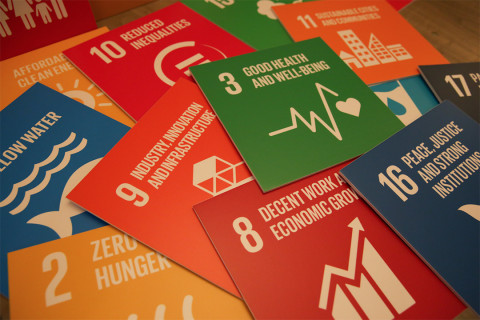
GCED Basic Search Form
Quick Search
当前位置
新闻

12 April 2019: The Arab Forum for Sustainable Development (AFSD) reflected on progress towards the five SDGs that will be reviewed at the July 2019 session of the UN High-level Political Forum on Sustainable Development (HLPF), in addition to Goal 17, which is reviewed each year. AFSD-19 focused on the theme, ‘Empowering People and Ensuring Inclusiveness and Equality in the Arab Region.’
The UN Economic and Social Commission for Western Asia (ESCWA) organized the AFSD, which convened from 9-11 April 2019 in Beirut, Lebanon. Over 300 participants attended the Forum.
In an opening address, UN Deputy Secretary-General Amina Mohammed said that the world is “not on track to deliver on the ambitions we set for ourselves,” but emphasized that the world is “determined to carry everyone along in our journey to 2030 and leave no one behind.” She said the Arab region, like many others, faces challenges including “insufficient growth, unemployment, inequality, climate change and natural disasters,” as well as challenges related to poverty, education and gender equality. Mohammed said the UN is working to achieve “more cohesive, adaptable and accountable UN country teams” to help support SDG implementation.
In her opening remarks, ESCWA Executive Secretary Rola Dashti announced the launch of the Young ESCWA initiative, which aims to be an incubator for innovative solutions to improve the lives of people in the Arab region, including its youth. She said ESCWA aims to involve young people in internal reforms to revitalize ESCWA and increase its effectiveness and efficiency.
AFSD-19 reviewed global and regional progress on the 2030 Agenda for Sustainable Development, and addressed progress on the five Goals under review in 2019: SDG 4 (quality education), SDG 8 (decent work and economic growth), SDG 10 (reduced inequalities), SDG 13 (climate action) and SDG 16 (peace, justice and strong institutions).
On education, the AFSD discussed supporting and building institutional capacity to promote environmental education and to enhance knowledge to support informed decisions on the environment as well as to create a generation conscious of environmental problems. On climate change, participants discussed the effects of climate change, including the region’s moderate vulnerability, and the need to strengthen resilience, reduce disaster risk, especially for vulnerable communities, develop informed mitigation measures, and promote research on adaptation monitoring tools and measures. AFSD-19 also supported promoting policy coherence for climate action, such as enhancing the interlinkages between climate change and water, energy and sustainable food systems, and financing climate actions, including by mainstreaming climate activities in budget allocations.
Participants reflected on national, regional and global follow-up and review processes, including voluntary national reviews (VNRs). Dashti said Arab States’ VNRs show that most States have adopted long-term development plans and more inclusive approaches. Countries shared lessons learned on VNRs, including the importance of: establishing an institutional structure for sustainable development that is linked to coordination committees and thematic task forces to facilitate the development of VNRs; and assigning a ministry as a focal point to coordinate national efforts with other ministries and stakeholders. Participants also discussed opportunities for engaging different stakeholders, including during initial consultations on the scope and priorities of the VNR report, during data collection and during the formulation, review and approval of the report. In 2019, Algeria, Iraq, Kuwait, Mauritania, Oman and Tunisia will present VNRs from the Arab region.
On messages for the 2019 HLPF, participants recognized the need for a new positive narrative on youth, including clarifying opportunities for youth to contribute to accelerating achievement of the SDGs. Participants supported the role of parliaments in monitoring progress towards the SDGs, and emphasized the need to involve parliaments in the VNR process and to promote partnerships between parliaments and other actors to enable parliaments to fulfill their oversight role and promote transparency and accountability. Participants further supported organizing a regional parliamentary forum on the 2030 Agenda in the Arab region.
The AFSD-19 also discussed messages related to national public resources and financing for the SDGs, including the importance of addressing tax evasion and illicit financial flows, the need to stimulate the private sector and find innovative ways to bridge funding gaps, and the potential for international trade to become an engine for sustainable development. The AFSD-19 reflected on a number of additional messages, including addressing conflict; promoting access to information and communications technology (ICT) and promoting digital education to accelerate development; and spreading the social protection floor.
In advance of the AFSD, the 2019 Regional Forum on Sustainable Development (RFSD) for Europe convened from 21-22 March 2019 in Geneva, Switzerland. The UN Economic and Social Commission for Asia and the Pacific (ESCAP) held its regional forum (APFSD-6) in Bangkok, Thailand, from 27-29 March 2019.
URL:
http://sdg.iisd.org/news/arab-forum-reviews-sdg-progress-crafts-messages-for-hlpf/
